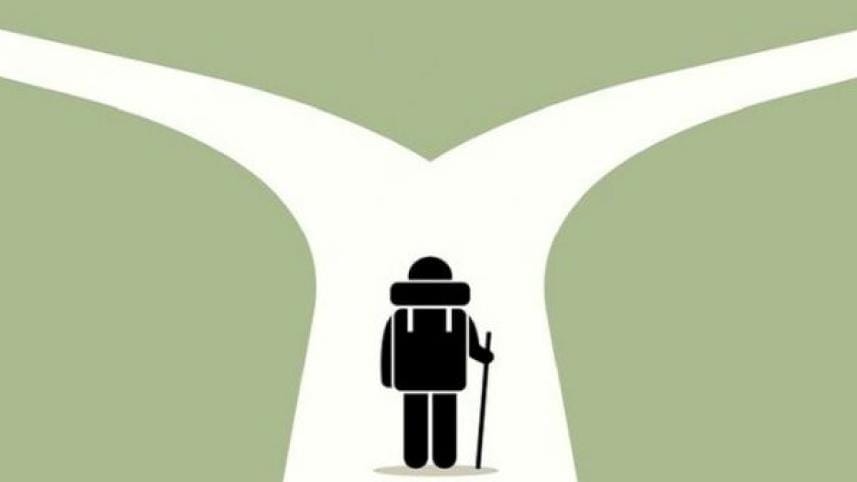The rat race: But at what cost?

The entire world is obsessed with speed and cramming more and more into less and less time, to an extent that you need to break stuff to prove your speed. And the 80-120 hours work week is now well known across the world because "nobody ever changed the world on 40 hours a week", says Elon Musk.
We used to dial; now we speed-dial. Similarly, now we speed read, we speed walk and we speed date. And even things that are by their very nature slow, we try to speed them up too. We know about "Speed Yoga". Recently, I've come across "One minute 'dua' for everything you need". So if you are not a hard-hustler, you are average while "slow" has become a dirty word in our culture. It's a byword for "lazy," "slacker," for being somebody who gives up. You know, "he's slow". It's actually synonymous with being stupid.
I once read about how Amazon used to keep ambulances outside its warehouses because it knew its workers would regularly faint from overwork. I read about workers who were so pushed for time that they brought empty Coke bottles to work to pee in. Yes, we got some impressive innovations out of speed, but they are few and far between. In the actual world, speedy innovation has become a scramble for survival. For fledgling ventures, if you don't succeed quickly, you not only fail fast, you fail abysmally.
Speed broadens our blind spots and can therefore facilitate costly errors. By necessity, aggressively racing toward an end-goal forces us to put our blinders on. In 2017, the US CPSC deemed all "hover boards" unsafe and recalled more than half a million of them after reports of explosions, fires, and even some fatalities. After the explosion, manufacturers started producing cheaper batteries that did not meet safety standards, all in a rush to meet consumer demand. An obsession to capitalise quickly on the "hover board" craze muted the most important factor: the safety of the customer.
NASA was founded less than a year after the Soviets launched Sputnik in 1957, spurring the ambitious goal of sending a manned vessel to the surface of the moon by the end of the 1960s. The aggressive nature of the space race with the Soviets resulted in the untimely deaths of three astronauts in the Apollo 1 programme, who perished in a fully preventable fire. This resulted from poor design choices out of the urgency of winning.
The purpose of this write-up is not to discourage and undermine speed. It's about choosing something as long as it is healthy and sustainable. Everything has a cost. You can't win fighting nature and its principles. Leaders should have this maturity, at least, to act on them. Slowing down is not the opposite of masculinity, although it has become a cultural taboo now. But we expect a leader to be trained on how to win over taboo.
We are about to forget that we can't control everything and the ups and downs are two parts of a natural cycle. Accepting it appropriately is the first and most courageous step toward a solution. Shams Tabrizi, the famous mentor of Rumi, says "If you think 'My life will be upside down' don't worry. How do you know down is not better than upside?" Many of us know the story of a poor Chinese village where a farmer and his son lived in a land with a small hut and an inherited horse. Once his horse ran away, neighbours regretted his loss. But he said, "How do you know that what happened was a misfortune in my life?"
Again when the horse came back with more horses his neighbours congratulated him but he replied, "But how do you know that what happened was a blessing in my life?" A month later, the farmer's son broke the mare in. However, the animal bucked wildly and threw the boy off; the boy fell awkwardly and broke his leg. Again the neighbours visited to sympathise with the farmer, but he said, "How do you know that what happened was a misfortune in my life?"
Each time his denial embarrassed his neighbours, and they considered him a madman. A few months went by, and Japan declared war on China. The emperor's emissaries scouted the country for healthy young men to be sent to the front. When they reached the village, they recruited all the young men, except the farmer's son, whose leg had not yet mended. Our failure to accept the uncertainty often leads us to suicidal desperation, although we have a better way to deal with it. Carl G Jung, the founder of analytical psychology, once said "Space flights are merely an escape, a fleeing away from oneself, because it is easier to go to Mars or to the moon than it is to penetrate one's own being."
On October 15, 1962, John F Kennedy woke up to a dramatically changed world. While he'd been sleeping, the CIA had identified Soviet nuclear missile sites being constructed in Cuba, less than a hundred miles from the American coast. Suddenly, America was threatened with the possibility of a nuclear attack. Despite the immense pressure from his advisors to meet the aggression with greater aggression to get over seventy million people out of risk, he slowed things down, stayed reflective and sought solitude. Eventually he announced a blockade on Cuba. It gave Soviet president Nikita Khrushchev time and space to think. And eleven days after the crisis began, the Soviet leader wrote to Kennedy. If leaders do not display statesmanlike wisdom, he wrote, they will clash, bringing mutual annihilation. The crisis was over, and negotiations over the removal of missiles began.
Rumi says, "You wander from room to room, hunting for the diamond necklace that is already around your neck". In "VUCA" (volatility, uncertainty, complexity and ambiguity), we can slow down, practice stillness and adopt "paradox mindset". When we find stillness, we can take better control over our decisions and our lives, instead of being buffeted by the tumultuous world around us. A paradox mindset shifts the focus from the need to choose between options A and B to instead learning how to balance these demands over time. Learning how to manage these competing demands more is, strangely, liberating. At first, reframe the question of, "Should I pivot or continue with what I have been doing?" to, "How can I both continue and pivot? How can one help the other?" Second, accept the discomfort and inconsistency. And third, search for alternative possibilities. "Can I do my work with so little?" to, "What alternative possibilities does this situation enable?", puts a slightly more positive spin on it.
It mightn't solve every problem, but it is a helpful and relevant way of thinking. By understanding that tensions are here to stay, we need to learn how to manage them over the long term. Either/or approach can lead to limited solutions and personal suffering, whereas adopting a paradox mindset boosts innovation, creativity and performance. The way we interpret our reality is vital, especially in a time of crisis.
Nazmus Sadat is an activist and a former Generation Change Fellow at the USIP.
Views expressed in this article are the author's own.
Follow The Daily Star Opinion on Facebook for the latest opinions, commentaries and analyses by experts and professionals. To contribute your article or letter to The Daily Star Opinion, see our guidelines for submission.




 For all latest news, follow The Daily Star's Google News channel.
For all latest news, follow The Daily Star's Google News channel.
Comments